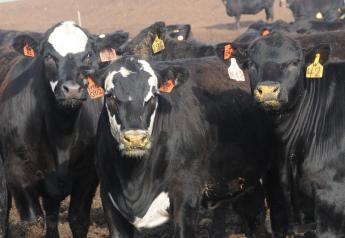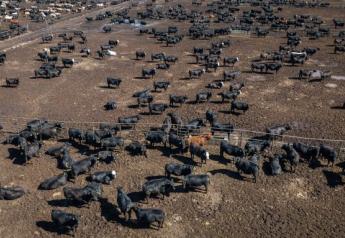Meat of the Matter: Driver -- or passenger?

Ask any animal activist about the changes affecting the meat and poultry industries, and they'll claim, 'We're the ones in the driver's seat.' But in actuality, they're only riding shotgun.
In the recent interview here on Drovers Cattlenetwork.com with Wayne Pacelle, the president and CEO of the Humane Society of the United States, he made the point that "reform," as activists prefer to label their mission, is about changing social mores.
One of which involves the definition of animal welfare as it applies to housing and living conditions. On that score, the humane community has distilled its wish list to a simple mantra: confinement is bad, antibiotics are worse and animals ought to roam free in some Disney-esque world of inter-species peace and harmony.
Unlike the millions of household pets upon which said activists lavish their love, by the way. The last thing any conscientious pet owner would ever do is let Fluffy or Fido "run free," or spend a single night enjoying a lifestyle free of "confinement housing."
But to Pacelle's point, a recent announcement by one of the nation's leading poultry producers seems to lend credence to the-world-is-changing lens through which animal activists tend to view the social landscape.
Just this week, Perdue announced that the company "will make its plants more humane and allow its animals to live better lives," according to a news release.
As the The New York Times reported, Perdue's poultry growout operations will soon have windows, additional space for its broilers, and in a strange way of phrasing it, a commitment to put "chickens to sleep before they are slaughtered."
Additionally, The Times reported, Perdue may "tinker with breeding to decrease the speed at which birds grow or to reduce their breast size, steps that could decrease the number and severity of leg injuries."
Okay, if "putting chickens to sleep" is awkward, promising to "tinker" with breeding is absolutely the wrong word to explain the company's new policy initiative to consumers.
For one, the breeding of food animals is decidedly not about tinkering with the animals' genetics. More to the point, the industry's focus on promoting efficiency — faster growth rates, better feed utilization, lower morbidity and mortality — has been deliberate, scientifically informed and precisely managed, and there is no reason to assume that a change in the end points of such an initiative would be conducted any differently.
Diction aside, a blog post Pacelle wrote underscored the point about how corporate America is reacting to "enlightened" consumer demand.
He called Perdue's announcement "a pivotal moment" for animal rights.
"HSUS previously sued Perdue for false labeling around animal welfare claims," Pacelle wrote, "and yet the company now has positioned itself at the head of the pack on the very issue we battled on."
Identifying the real dynamics
I can't blame Pacelle and HSUS for trying to take credit for the changes among meat and poultry industry companies on animal welfare issues. Truth be told, the activist "movement" has been one of the forces shaping the dynamics of such hot-button topics as antibiotics in animal agriculture, or confinement housing in pork and poultry production.
However, let's not lose sight of the reality that the exact same "consumer demand" is what drove industry's obsession with efficiency in the first place. Virtually every issue that gets animal activists riled up is traceable to the pressure applied by the American public for cheap food.
For example: Take fast-food, every do-gooder's favorite whipping boy. Why is it that the fast-food industry exploded in the '60s and '70s? Plenty of commentators would claim that convenience was key, and undeniably, the ability to drive-thru to pick up your order was an important factor in its phenomenal growth.
But drive-thrus only became significant factors years after McDonald's, Burger King and Kentucky Fried Chicken were racking up billions in sales and profits. The primary dynamic fueling fast-food growth in the industry's first couple decades was the fact that the burgers, fries and shakes were cheap. Being able to buy dinner for the whole family for less than $10 bucks was huge.
I know. I was there, and as a kid in the 1950s, yes: there was a novelty, an excitement about pulling up to a McDonald's — fast-food, after all, appeals to our most basic sensory appetites. But the reason my parents, and millions of other American adults, chose to patronize those restaurants wasn't culinary, it was financial.
Activists claim the credit for any of a host of remarkable changes in our collective lifestyles over the past two generations, mainly because of how fast and furious those changes occurred.
In the 1970s, who would have imagined that recycling would become a deep-seated value every kid embraces from kindergarten on up?
In the 1980s, who would have predicted a total, society-wide ban on smoking practically anywhere in public?
And in the 1990s, who could have imagined that a few short years later, marriage equality would be the law of the land, and not only that, a development the majority of Americans would support?
But although activist campaigns helped to accelerate significant shifts in attitudes, lifestyles and even legalities, it's a combination of economics, demographics and technology that creates the conditions conducive to such changes.
And with issues of food animals' well-being, it's the relative affluence of much of America, the incredible affordability (and availability) of the food supply, and the public's staggering disconnect from agriculture that set the stage for Perdue's welfare initiatives.
Wayne Pacelle can take all the credit he likes for such an evolution.
In the end, though, activists rarely catalyze social change, they simply capitalize on those changes in ways that make it seem as if they're the agents of change, not merely the students.
The opinions expressed in this commentary are solely those of Dan Murphy, a veteran food-industry journalist and commentator.







